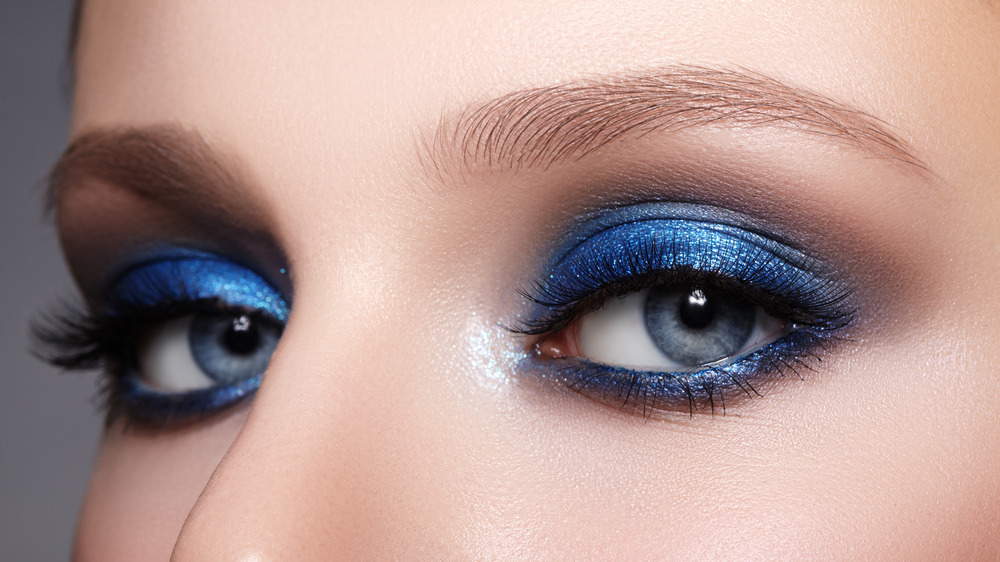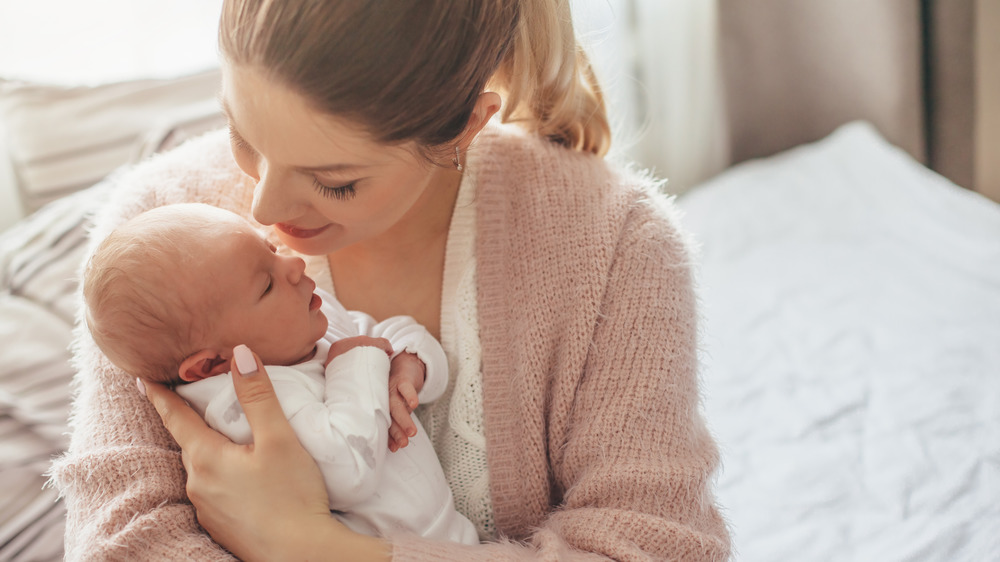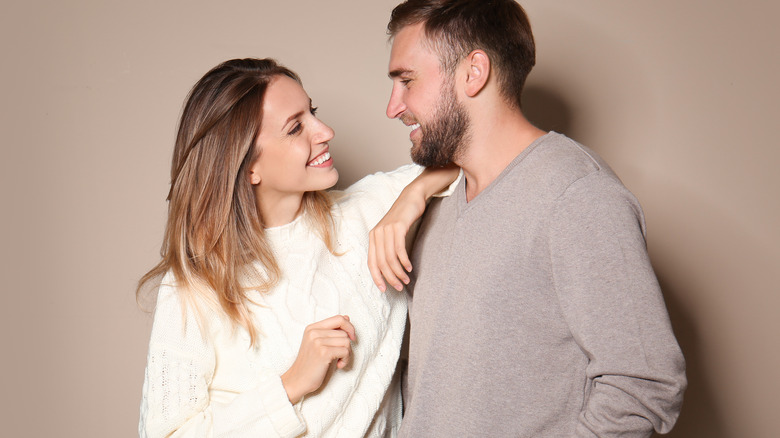Surprising Side Effects Of Having Blue Eyes
Blue eyes do get lots of attention. Although not quite rare — that distinction belongs to green and gray, per Healthline — they are uncommon enough, occurring in just 8 to 10% of the world's population, that they do get noticed. So if you have baby blues, you've probably gotten many compliments. But besides their beautiful hue, blue eyes have benefits and drawbacks when it comes to health. Read on to discover the associations blue irises have with certain conditions and characteristics.
The first drawback is a higher susceptibility to vision problems. Bright sunlight and fluorescent lights may cause a blue-eyed person to have trouble focusing (via DukeHealth). Because blue eyes have low amounts of light-absorbing pigments, more light gets through the iris. This means that people with blue eyes tend to be more light-sensitive, Ruth Williams, M.D., president-elect of the American Academy of Ophthalmology, told EverydayHealth.
Another downside is the increased risk of eye disease. The fact that blue-hued irises allow more harmful ultraviolet light to pass through to the retina can cause more problems. One study found that people with light-colored eyes are twice as likely to develop age-related macular degeneration, reports WebMD. And they're also subject to an increased risk of eye cancer — melanoma of the uvea, which is the middle layer of the eye. Luckily, not only is this cancer rare, but your chances of being diagnosed with it are reduced by diligently wearing UV-protected sunglasses.
Some surprising health risks for those with blue eyes
Those with baby blues may have a greater tendency toward alcoholism. It's definitely odd, but it appears that blue-eyed people are more likely to be alcoholic. Of the studies that examined the link between light-colored eyes and alcoholism, one found that those with brown eyes were more susceptible to feeling the effects of alcohol. Because of this susceptibility, they drank less, therefore not reaching the amount of alcohol that would make them dependent (via ResearchGate). A more recent study looked at over 1,200 people who were either diagnosed alcoholics or weren't alcoholics but sometimes consumed alcohol. It found a higher correlation between lighter eye color — particularly blue — and alcoholism than between brown eye color and alcoholism. The theory is a gene that carries a mutation leading to increased alcohol tolerance lies near the gene that has a major impact on eye color.
By now, blue-eyed folks may be thinking they've lost the genetic lottery. Unfortunately, there's more. They're also more prone to hearing loss because melanin (the pigment that gives skin, hair, and eyes color) is in the ears as well, and offers greater protection against loud sounds. Research has also linked blue eyes and fair skin with a higher risk of getting type 1 diabetes, while women with endometriosis have blue eyes more than any other color. But don't give up hope!
Now for the good news for blue-eyed people
Having blue eyes may make you a better strategic thinker. A study conducted back in 2007 at the University of Kentucky came to the conclusion that those with blue eyes might be better strategic thinkers, as they tend to excel at physical activities that require planning and strategy, such as golf and cross-country running, while brown-eyed folks do better at movements based on reaction time, including football and hockey (via Daily Mail).
Another positive note for those with blue peepers is a higher pain tolerance. A small (but encouraging) study for blue-eyed women, by geneticist Inna Belfer at the University of Pittsburgh, assessed the overall pain experiences of women in labor, from their antepartum and postpartum pain, to their mood, sleep, and coping behavior after the birth (per MedicalDaily). The study found that women with light-colored eyes experienced less discomfort in labor than women with dark eyes, who felt more pain at rest and when moving, and woke from pain more often. Additionally, the blue-eyed women were less anxious and less likely to become depressed after the baby arrived. Now, that's a nice perk for blue-eyed moms-to-be!
Blue eyes are considered more attractive
One study out of Norway showed that blue-eyed women were perceived as more attractive than their brown-eyed counterparts. But no need to get upset if your peepers are brown. It was a small study with a huge caveat. Published in Behavioral Ecology and Sociobiology, the study demonstrated that women were considered more attractive by male viewers when they were shown in a photo with blue eyes rather than with brown eyes.
The caveat? They were only considered more attractive by men who themselves had blue eyes. Brown-eyed men showed no preference for eye color. As is the case with many male sexual preferences, the draw toward blue eyes over brown in a potential mate is likely based on paternity. According to the rules of genetics, two blue-eyed parents can only have a blue-eyed child. And if the little one arrives with brown eyes? Dad can only conclude that mom was unfaithful and thus men may be hardwired to value a physical trait that mirrors their own kin (via Reuters).
Having blue eyes may mean better mental health
Turns out, there's even more good news for those with blue eyes, including the fact that they're less susceptibility to seasonal affective disorder (SAD). A study out of two European universities investigated whether eye color affected how likely a student was to suffer from (SAD), a form of clinical depression that emerges during the winter months. In the study, researchers gave a sample of 175 students a questionnaire that assessed their SAD symptoms. Those with blue eyes scored much lower on the questionnaire than brown-eyed students, meaning they were less susceptible to suffering from SAD, according to Science Alert.
The reason for this advantage may be that light eyes have less pigment and absorb less light as it travels through the eye to the hypothalamus, the part of the brain that controls the sleep cycle and other biological processes. Meanwhile, because brown eyes have more pigment, they absorb more light, according to Science Alert. A greater amount of light reaching the hypothalamus triggers less melatonin to be released, thereby providing blue-eyed folks with greater protection against SAD.





